
The Allman Brothers Band was an American rock band formed in Jacksonville, Florida in 1969 by brothers Duane Allman and Gregg Allman, as well as Dickey Betts, Berry Oakley (bass), Butch Trucks (drums), and Jai Johanny "Jaimoe" Johanson (drums). Subsequently, based in Macon, Georgia, they incorporated elements of blues, jazz and country music and their live shows featured jam band-style improvisation and instrumentals.
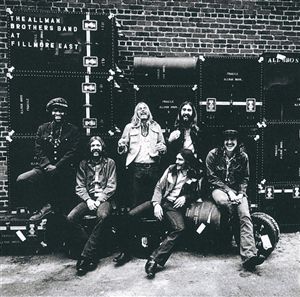
At Fillmore East is the first live album by American rock band the Allman Brothers Band, and their third release overall. Produced by Tom Dowd, the album was released on July 6, 1971, in the United States by Capricorn Records. As the title indicates, the recording took place at the New York City music venue Fillmore East, which was run by concert promoter Bill Graham. It was recorded over the course of three nights in March 1971 and features the band performing extended jam versions of songs such as "Whipping Post", "You Don't Love Me" and "In Memory of Elizabeth Reed". When first commercially released, it was issued as a double LP with just seven songs across four vinyl sides.

Eat a Peach is a 1972 double album by American rock band the Allman Brothers Band, containing a mix of live and studio recordings. Following their artistic and commercial breakthrough with the July 1971 release of the live album At Fillmore East, the Allman Brothers Band got to work on their third studio album. Drug use among the band became an increasing problem, and at least one member underwent rehab for heroin addiction. On October 29, 1971, lead and slide guitarist Duane Allman, group leader and founder, was killed in a motorcycle accident in the band's adopted hometown of Macon, Georgia, making it the final album to feature him.

Howard Duane Allman was an American rock and blues guitarist and the founder and original leader of the Allman Brothers Band, for which he was posthumously inducted into the Rock and Roll Hall of Fame in 1995.
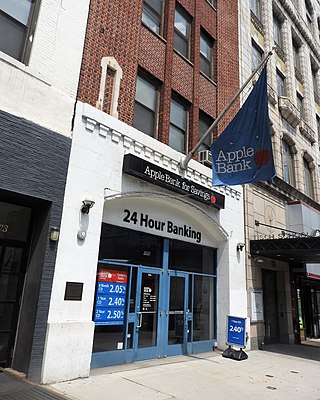
The Fillmore East was rock promoter Bill Graham's rock venue on Second Avenue near East 6th Street on the Lower East Side section of Manhattan, now called the East Village, in New York City. The venue was open from March 8, 1968, to June 27, 1971, and featured some of the biggest acts in rock music of that time. The Fillmore East was a companion to Graham's Fillmore Auditorium, and its successor, the Fillmore West, in San Francisco.
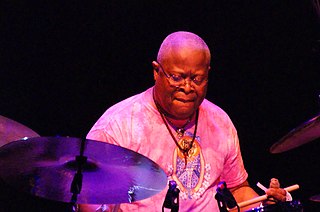
John Lee Johnson, frequently known by the stage names Jai Johanny Johanson and Jaimoe, is an American drummer and percussionist. He is best known as one of the founding members of the Allman Brothers Band.

The Allman Brothers Band is the debut studio album by American rock band the Allman Brothers Band. It was released in the United States by Atco Records' subsidiary Capricorn on November 4, 1969, and produced by Adrian Barber. Formed in 1969, the Allman Brothers Band came together following various musical pursuits by each individual member. Guitarist and bandleader Duane Allman moved to Jacksonville, Florida where he led large jam sessions with his new band, one he had envisioned as having two guitarists and two drummers. After rounding out the lineup with the addition of his brother, Gregg Allman, the band moved to Macon, Georgia, where they were to be one of the premiere acts on Capricorn.

Brothers and Sisters is the fourth studio album by American rock band The Allman Brothers Band. Co-produced by Johnny Sandlin and the band, the album was released in August 1973 in the United States by Capricorn Records. Following the death of group leader Duane Allman in 1971, the Allman Brothers Band released Eat a Peach (1972), a hybrid studio/live album that became their biggest-selling album to date. Afterwards, the group purchased a farm in Juliette, Georgia, to become a "group hangout". However, bassist Berry Oakley was visibly suffering from the death of Duane, excessively drinking and consuming drugs. In November 1972, after nearly a year of severe depression, Oakley was killed in a motorcycle accident, making it the last album on which he played.
Thom "Ace" Doucette is an American blues harmonica player from the Sarasota, Florida region. He is best known for having played with The Allman Brothers Band in the 1970s and later, although he was never an official member.
"In Memory of Elizabeth Reed" is an instrumental composition by the American group The Allman Brothers Band. It first appeared on their second studio album, Idlewild South (1970), released on Capricorn Records. The jazz-influenced piece was written by guitarist Dickey Betts, among his first writing credits for the group. Betts named it after a headstone he saw for Elizabeth Jones Reed Napier in Rose Hill Cemetery in the band's hometown of Macon, Georgia. Multiple versions of the composition have been recorded, with the version performed on the group's 1971 live album At Fillmore East generally considered the definitive rendition.

Dick's Picks Volume 4 is the fourth live album in the Dick's Picks series of releases by the Grateful Dead. It was recorded on February 13 and February 14, 1970, at the Fillmore East in New York City, and released in February 1996. It was the first of the Dick's Picks CDs to have three discs. It was also the first Dead album to include the song "Mason's Children".

The Allman Brothers Band was an American rock band formed in Jacksonville, Florida, in 1969 by brothers Duane Allman and Gregg Allman, as well as Dickey Betts, Berry Oakley, Butch Trucks (drums), and Jai Johanny "Jaimoe" Johanson (drums). The band incorporated elements of Southern rock, blues, jazz, and country music, and their live shows featured jam band-style improvisation and instrumentals.

Live at the Atlanta International Pop Festival: July 3 & 5, 1970 is a two-CD live album by the Allman Brothers Band. It features their two performances at the 1970 Atlanta International Pop Festival, at the Middle Georgia Raceway in Byron, Georgia. It was released in 2003.

S.U.N.Y. at Stonybrook: Stonybrook, NY 9/19/71 is a two-CD live album by the Allman Brothers Band. The second of a series of archival concert albums from the Allman Brothers Band Recording Company, it features the original lineup of the group. It was released in 2003.

Gold is a two-CD compilation album by the Allman Brothers Band. It contains songs selected from their first eight albums, which were released by Capricorn Records — The Allman Brothers Band (1969), Idlewild South (1970), At Fillmore East (1971), Eat a Peach (1972), Brothers and Sisters (1973), Win, Lose or Draw (1975), Wipe the Windows, Check the Oil, Dollar Gas (1976), and Enlightened Rogues (1979). It was released by Island Records on October 11, 2005. It is a reissue of the 2001 expanded compilation The Road Goes On Forever: A Collection of Their Greatest Recordings.
"Whipping Post" is a song by The Allman Brothers Band. Written by Gregg Allman, the five-minute studio version first appeared on their 1969 debut album The Allman Brothers Band. The song was regularly played live and was the basis for much longer and more intense performances. This was captured in the Allman Brothers' 1971 double live album At Fillmore East, where a 22-minute, 40-second rendition of the song takes up the entire final side. It was this recording that garnered "Whipping Post" spots on both the Rock and Roll Hall of Fame's 500 Songs that Shaped Rock and Roll list and Rolling Stone's list of "The 500 Greatest Songs of All Time", which wrote, "the song is best appreciated in the twenty-three-minute incarnation on At Fillmore East."
"One Way Out" is a blues song that was recorded in the early 1960s by both Sonny Boy Williamson II and Elmore James. A reworking of the song by G. L. Crockett, titled "It's a Man Down Here", appeared on the Billboard record charts in 1965. In 1971, the Allman Brothers Band recorded an updated live version of the song, which was included on their popular Eat a Peach album (1972).

Fillmore East, February 1970 is a live album by the rock group the Allman Brothers Band. It was recorded by Owsley Stanley at the Fillmore East in Manhattan on February 11, 13, and 14, 1970. It was released on CD in 1996.
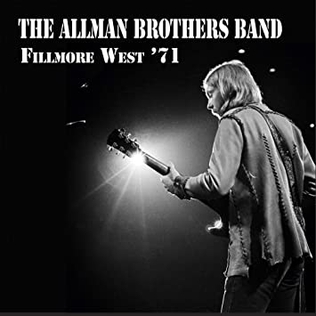
Fillmore West '71 is a four-CD live album by the Allman Brothers Band. It was recorded January 29 – January 31, 1971, at the Fillmore West in San Francisco. It was released on September 6, 2019.
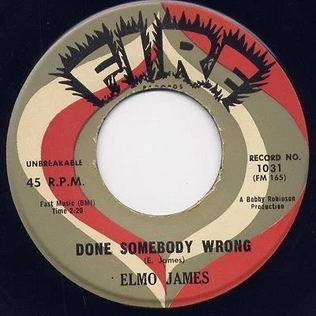
"I Must Have Done Somebody Wrong" is a blues song written and recorded by Eddie Kirkland in 1959. Using the same lyrics but modifying aspects of the music, Elmore James recorded it as "Done Somebody Wrong" in 1960; he took sole writing credit for it and it came to be known as an Elmore James song. "Done Somebody Wrong" was interpreted by the Allman Brothers Band in 1971 and featured on their classic live album At Fillmore East. As Billboard magazine has stated, the song became "more associated with the Allmans than with James in the end."















